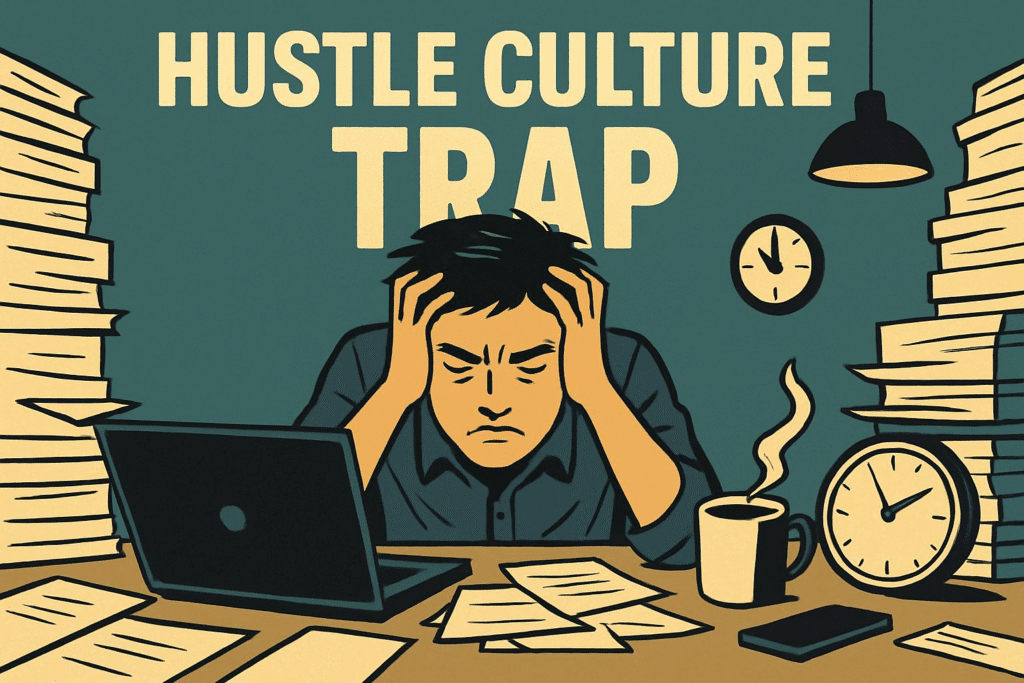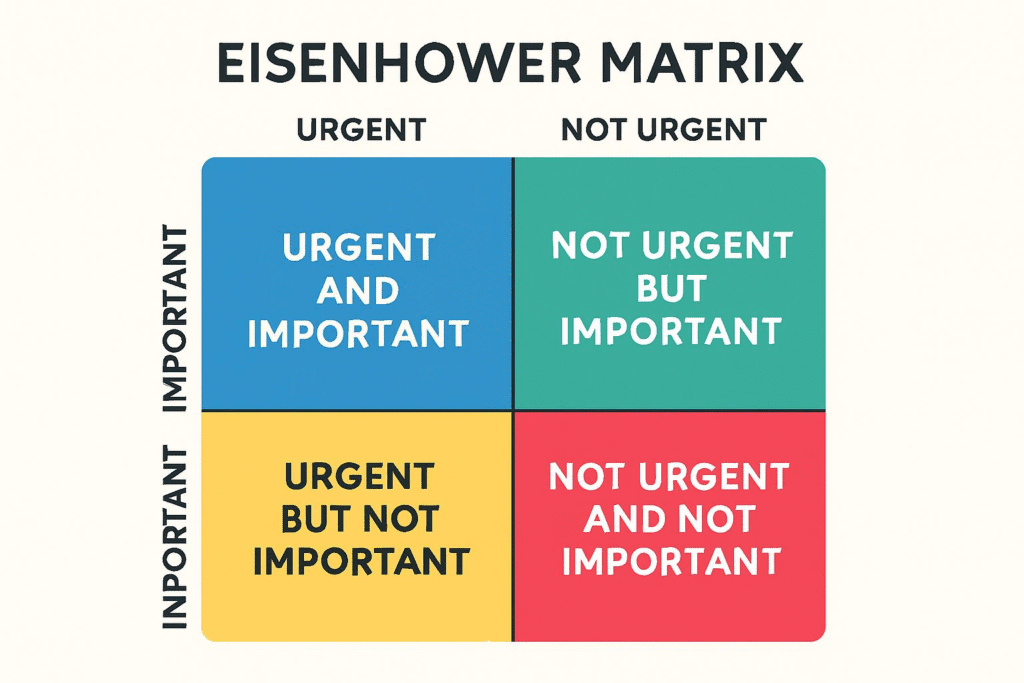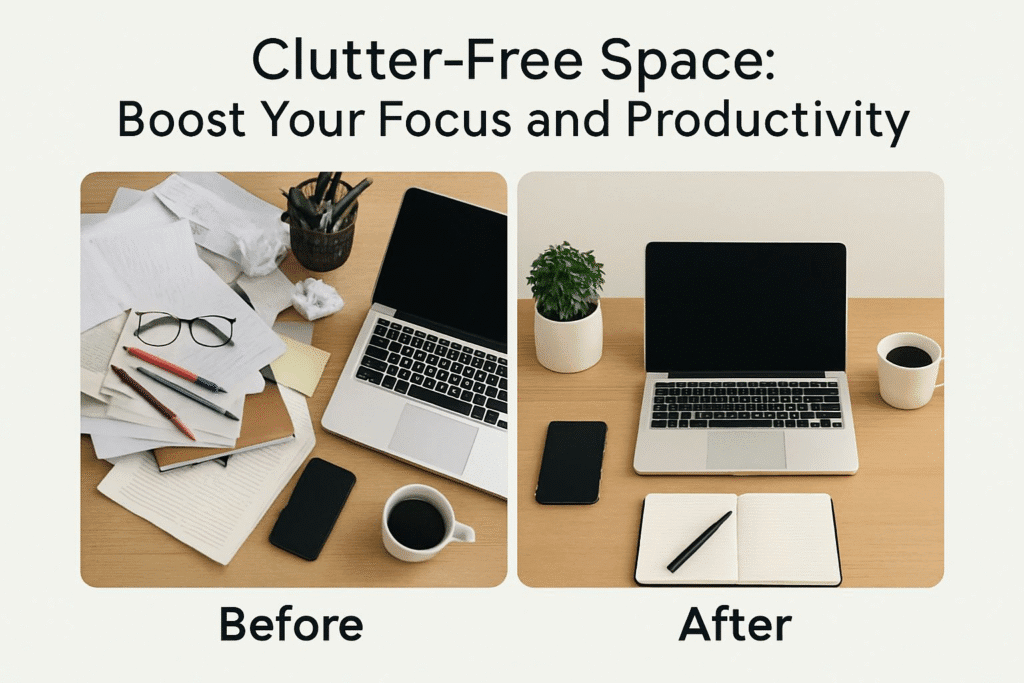Introduction

Hustle culture is everywhere. You’re constantly bombarded with advice like, “Rise and grind,” “No days off,” and “Work hard, play hard.”
But here’s the truth: despite all the “hustle,” many people still end up stuck — financially, emotionally, and mentally. You’re working long hours, checking off to-do lists, and pushing yourself to the limit. Yet, the results don’t match the effort.
Why?
It’s not a lack of effort that’s holding you back. It’s a lack of strategy. The truth is, productivity doesn’t always lead to progress. And “hustling” without a clear direction won’t make you rich.
In fact, most people fall into the trap of feeling busy but not being productive. They’re caught in a cycle of endless tasks that give them the illusion of productivity, but it’s all smoke and mirrors.
In this blog, we’ll break down why hustling hard isn’t enough. We’ll dive into the reality behind true productivity, the importance of focusing on the right tasks, and how you can shift your mindset to actually see results. No more chasing productivity for the sake of it — let’s talk about what really moves the needle.
The Problem with Hustle Culture: Busy vs. Productive
Hustle culture makes it seem like the more you work, the more success you’ll achieve. But here’s the harsh reality: working non-stop doesn’t guarantee results. In fact, you might be wasting precious time on activities that won’t move the needle for you.
The difference between being busy and being productive is crucial. Busy is doing a lot of things with little impact. Productive is focusing on high-leverage tasks that directly lead to your goals.
Think about it: how many times have you spent an entire day “working” but at the end of it, felt like you accomplished nothing significant? That’s the problem with hustle culture — it encourages a false sense of progress. You feel like you’re getting ahead because you’re busy, but you’re just spinning your wheels.
Productivity is about working smarter, not harder. It’s about being intentional with your time, prioritizing the right tasks, and cutting out distractions. Hustle without direction is a recipe for burnout, not success.
The Hustle Fallacy: Why More Work Doesn’t Equal More Money
Here’s a painful truth: working harder won’t automatically lead to financial freedom. Many people buy into the myth that the more hours they put in, the more they’ll earn. But in reality, there’s a limit to how much you can work, and there’s only so much time in a day.
Think about high-income earners — they don’t make money simply by working more hours. They create value, innovate, and build systems that generate passive income. These people don’t rely solely on hustle, but rather on working strategically.
The hustle fallacy traps you into a cycle of overwork, but it doesn’t help you escape the grind. Instead of focusing on “grinding” all the time, you need to focus on how you can create leverage in your work. What can you automate, delegate, or build that works for you when you’re not actively putting in hours?
More work doesn’t necessarily mean more success. It’s about being resourceful, strategic, and ensuring your efforts align with your bigger goals.
The Real Key to Success: Leveraging Systems and Mindset
Here’s the reality: success isn’t about the grind; it’s about smart work, strategic thinking, and systems that allow you to scale. The key to financial freedom is creating systems that work for you, not against you. Whether it’s automating parts of your business, building passive income streams, or investing in assets that appreciate over time, systems allow you to step away from the constant hustle.
Building a business or wealth doesn’t mean slaving away 12 hours a day. It’s about having the right mindset that values working smarter, not harder. People who succeed don’t just hustle—they create processes, innovate, and understand where their energy is best invested.
Your mindset is crucial here. If you’re constantly focused on grinding, you’re more likely to overlook opportunities to work efficiently. A successful mindset involves recognizing the importance of leveraging time, resources, and knowledge. It’s about figuring out how to multiply your efforts without burning yourself out.
Remember, it’s not about working harder; it’s about working with purpose and using strategies that optimize your time and energy.
The Power of Systems: How Successful People Do More with Less
Building systems isn’t a luxury—it’s a necessity for success. Successful individuals don’t spend their days chasing every opportunity. Instead, they develop systems that allow them to focus on what truly matters.
Think about it: most businesses operate with a well-defined structure. Marketing, sales, customer service—they all run like a well-oiled machine. The same applies to personal productivity. Whether it’s creating a morning routine that sets you up for the day or automating tasks that otherwise eat up your time, systems give you control. They help streamline your actions, reduce decision fatigue, and free up more time for high-level activities.
This is where people go wrong when they believe that hustling nonstop will lead to success. Hustling might create short-term results, but it’s not sustainable in the long run. That’s why systems are key. A system is something you can rely on to function without you having to think about it. It’s a tool that works for you, while you’re focused on higher-priority tasks.
Let’s break this down:
- Automating Repetitive Tasks: Use tools and apps to handle tasks that don’t require constant attention. For example, social media scheduling tools, email marketing platforms, and payment processing services.
- Delegating: Building a team or outsourcing tasks can make a world of difference. You can focus on your zone of genius while others handle the routine work.
- Creating Processes: Whether it’s a personal workflow for handling your emails or a system for growing your business, processes save time and reduce errors.
The key here is efficiency, not just productivity. Efficiency means you’re working smarter, not harder. By focusing on developing systems, you’re ensuring that every effort you make contributes to a larger, sustainable goal.
Why Hustling Doesn’t Equal Success: The Myth of ‘Work Hard, Play Hard’
We’ve all heard it: “Work hard, play hard.” This phrase suggests that relentless hustle and sleepless nights will eventually lead to success and freedom. While there’s some truth to putting in effort, it overlooks the fact that constant hustle often leads to burnout, stress, and poor decision-making.
Here’s the hard truth: working harder doesn’t always mean working smarter.
When you’re hustling nonstop, you’re focusing on the wrong thing—output. But success isn’t about how much you can produce in a day. It’s about what you can produce consistently over time without sacrificing your health, relationships, or sanity. This is where the hustle culture falls short.
Instead of striving to “do more,” shift your mindset to do what matters more. Ask yourself: Does this task bring me closer to my ultimate goal? Or is it just another thing to tick off the list?
This is where working smart becomes the game-changer.
By building effective systems, automating mundane tasks, and maintaining focus on high-priority activities, you reduce the need to hustle. You work more intentionally, and the results follow.
The key here isn’t how long you work, but how well you structure your time and efforts. Start thinking in terms of impact, not effort.
The Hustle Trap: How Chasing Busywork Keeps You Stuck

Hustling makes you feel productive, but let’s be honest: how much of what you’re doing actually moves the needle forward? The truth is, most people are stuck in a loop of busywork—activities that feel productive but don’t truly advance your goals. Whether it’s checking off tasks that don’t matter or responding to emails that are low-priority, hustling often distracts you from the deep work that creates real progress.
In a world where being “busy” is a badge of honor, we forget to ask the most important question: Am I being productive or just active?
You could be working 14-hour days, but if you’re focusing on the wrong things, it’s like running in circles. Instead of hustling more, you need to stop and evaluate what truly drives your success.
Here’s the secret: it’s not about working harder, it’s about being strategic with your time. By focusing on high-value tasks, delegating low-impact activities, and learning to say no, you’ll free up the space needed for true growth.
Hustle culture encourages working hard for the sake of working hard. But success isn’t about filling your day with a thousand tasks; it’s about aligning your efforts with your most important goals.
Stop chasing busywork, and start chasing results.
Breaking the Cycle: How to Focus on What Truly Matters

Let’s face it: we’ve all fallen into the hustle trap. You wake up, work on a thousand things, feel productive at the end of the day—and yet, you’re still no closer to your big goals. Why? Because it’s easy to confuse activity with productivity.
The trick is to focus on what truly moves the needle. Ask yourself: Are the tasks I’m doing aligned with my long-term vision? If they’re not, you’re wasting energy on things that won’t bring you closer to success.
Here’s the real key: mastering productivity isn’t about working longer hours. It’s about prioritizing.
By focusing on high-leverage activities—those few things that make the biggest impact—you’ll start seeing real results. This doesn’t mean abandoning hustle altogether; it just means getting smarter about how you hustle. Instead of drowning in emails and meetings, spend your energy on what really drives growth.
Successful people aren’t the ones with the longest to-do lists—they’re the ones who know where to focus their time and energy.
Start breaking the cycle by making strategic choices. Prioritize, delegate, and eliminate distractions. Doing so will allow you to work smarter, not harder, and finally get the results you’ve been hustling for.
The Illusion of Hustle: Why Working Harder Isn’t the Answer
The modern hustle culture glorifies the grind. But here’s the truth: working harder doesn’t guarantee success. In fact, it often leads to burnout, stress, and frustration.
The idea that constant hustling equals progress is a myth. It’s not about how many hours you put in—it’s about how you use those hours. Think about it: if you’re not working on the right things, you’re spinning your wheels, not moving forward.
You can work 14-hour days and still be stuck in the same place, with no real gains. Why? Because you’re not focused on the tasks that truly drive results. The key isn’t just to work harder but to work smarter. Instead of constantly grinding, step back and assess whether the work you’re doing is actually moving you closer to your goals.
To break free from the hustle trap, start by being more strategic with your time. Identify what truly matters and what brings the most value. Cut out distractions, stop overloading your schedule, and focus on tasks that have a real impact. This is how you go from hustling for the sake of it to making meaningful progress.
So, instead of working harder, start working smarter. That’s where real productivity comes from.
The Real Problem: You’re Chasing Validation, Not Results

The hustle culture isn’t just about working harder—it’s about showing off how much you’re working. We live in a world where productivity is seen as a badge of honor. It’s not about achieving outcomes but about appearing busy. And that’s where you get stuck.
Chasing validation leads you to do things that don’t align with your goals. You spend all day responding to emails, jumping into meetings, and handling tasks that don’t move the needle. These activities make you feel productive, but they don’t drive the results you need.
This false sense of productivity is dangerous. You think you’re making progress, but you’re just running in circles. You need to ask yourself: Is this task helping me reach my end goal, or am I just busy looking productive?
Instead of chasing applause for your hard work, focus on the real, often harder, work that leads to tangible outcomes. Prioritize results over busywork, and watch how your productivity shifts.
The Hidden Cost of ‘Hustle’—Why Your Health and Relationships Suffer
Hustling 24/7 might seem like the answer to success, but it comes at a cost. When you’re constantly grinding, you’re neglecting the most important parts of your life: your health and your relationships.
The ‘hustle’ mentality pushes you to ignore rest, exercise, and nutrition—all essential elements for maintaining peak productivity. It tells you to grind through exhaustion, skip meals, and skip social events to stay ahead of the competition. But at what cost?
Your body is not a machine. Ignoring your health leads to burnout, stress, and even chronic illness, which in turn affects your ability to be productive in the long run. Moreover, when you’re obsessed with hustling, your personal relationships take a hit. You’re too busy chasing success to nurture the people who matter most to you.
True productivity is not about burning yourself out. It’s about working smarter, not harder. By prioritizing your well-being, you’ll actually increase your output, achieve your goals faster, and, most importantly, enjoy the journey. Balance is key to long-term success.
The Importance of Strategic Rest: Why Overworking is Counterproductive
Many think that the key to success is working non-stop, but that’s a misconception. In reality, rest is a crucial part of productivity. If you’re constantly working without breaks, your brain and body become fatigued, and your efficiency declines. You might feel busy, but are you truly productive?
Research shows that after long hours of continuous work, the quality of your output diminishes. Your brain needs time to recharge in order to make high-quality decisions, stay creative, and problem-solve effectively.
Strategic rest isn’t just about sleep—it’s about taking breaks throughout your workday to clear your mind and reset your energy. This could mean taking a walk, meditating, or simply stepping away from your desk for a few minutes. When you return, you’ll find that you’re more focused and your work output increases.
Incorporating strategic rest into your routine helps prevent burnout, improves mental clarity, and leads to greater success in the long run. Don’t confuse being busy with being productive—rest is a key ingredient to sustained productivity and success.
Conclusion: Breaking the Cycle of the Hustle Fallacy

The truth is, hustling nonstop is not the path to lasting success. The Productivity Lie perpetuates the idea that working more hours automatically leads to greater results, but in reality, it’s strategic work and effective rest that produce true productivity.
Instead of glorifying constant busyness, shift your focus to working smarter, not harder. Embrace the power of efficiency, mindset, and proper recovery to achieve more while maintaining balance. Success doesn’t come from relentless hustle—it comes from working with intention, staying focused, and taking care of yourself along the way.
Remember: It’s not about how much you do, it’s about how well you do it.
Books to Help You Break the Productivity Trap
- “Atomic Habits” by James Clear
A transformative guide on how small habits lead to big changes. James Clear explains how focusing on tiny, incremental changes can reshape your life and lead to sustainable success. - “Deep Work” by Cal Newport
This book teaches you how to engage in focused work and avoid distractions. Newport argues that deep work is the key to mastering complicated tasks and achieving significant career success. - “The 4-Hour Workweek” by Tim Ferriss
Tim Ferriss outlines how to break free from the traditional workweek and optimize your life for freedom and flexibility. It challenges the hustle culture and offers strategies for creating more impactful results with less effort. - “The War of Art” by Steven Pressfield
A must-read for anyone looking to overcome procrastination and resistance. Pressfield discusses the creative process and how to push through internal barriers to get things done. - “Essentialism: The Disciplined Pursuit of Less” by Greg McKeown
Greg McKeown explores how focusing on what truly matters can help you achieve more by doing less. This book offers practical advice on how to streamline your work and life.
These books provide valuable insights that challenge the hustle culture and promote a more sustainable, intentional approach to productivity and success. Each one offers strategies to help you stop spinning your wheels and start making real progress.
FAQ’s
Why am I still not successful despite working hard?
It’s common to believe that constant hard work will lead to success, but true success isn’t just about hustling. It’s about working smart, focusing on high-leverage tasks, and creating systems that allow you to scale efficiently. Hard work without strategy or clear goals can often lead to burnout without tangible results.
What is the difference between hustle culture and true productivity?
Hustle culture glorifies working excessively and constantly. However, true productivity is about intentional work, prioritizing tasks that move you closer to your goals, and maintaining balance. Hustling endlessly can lead to exhaustion and distractions, while productivity is about working smarter, not harder.
How can I break free from the ‘hustle’ mentality?
To break free from the hustle mentality, start by redefining what productivity means to you. Focus on tasks that provide the highest return on investment and don’t fall into the trap of doing everything just to stay busy. Invest in systems, eliminate distractions, and focus on sustainable progress.
How do I prioritize tasks effectively?
Use strategies like the Eisenhower Matrix to categorize tasks by urgency and importance. Focus on high-priority tasks that align with your long-term goals and delegate or eliminate the rest. Remember, not all tasks are created equal, and some will make a much bigger impact than others.
Can ‘hustle’ ever lead to success?
Hustling can provide short-term results but often at the cost of long-term sustainability. Success isn’t just about working nonstop; it’s about making the right choices, being consistent, and focusing on what truly matters. Incorporating rest, reflection, and strategic planning is crucial for lasting success.
How do I avoid burnout while trying to be productive?
To avoid burnout, take regular breaks, set realistic expectations, and make time for rest and recovery. Consistently working without taking time to recharge can deplete your energy, reduce creativity, and lower productivity. Ensure you’re creating a balanced approach to work that includes self-care.
What can I do to improve my productivity without falling into the ‘hustle trap’?
Focus on prioritizing high-impact tasks, eliminating distractions, and creating systems that work for you. Embrace tools like time blocking, batching tasks, and setting clear boundaries around work and personal life. Also, remember that rest and reflection are just as important as work in the productivity equation.
